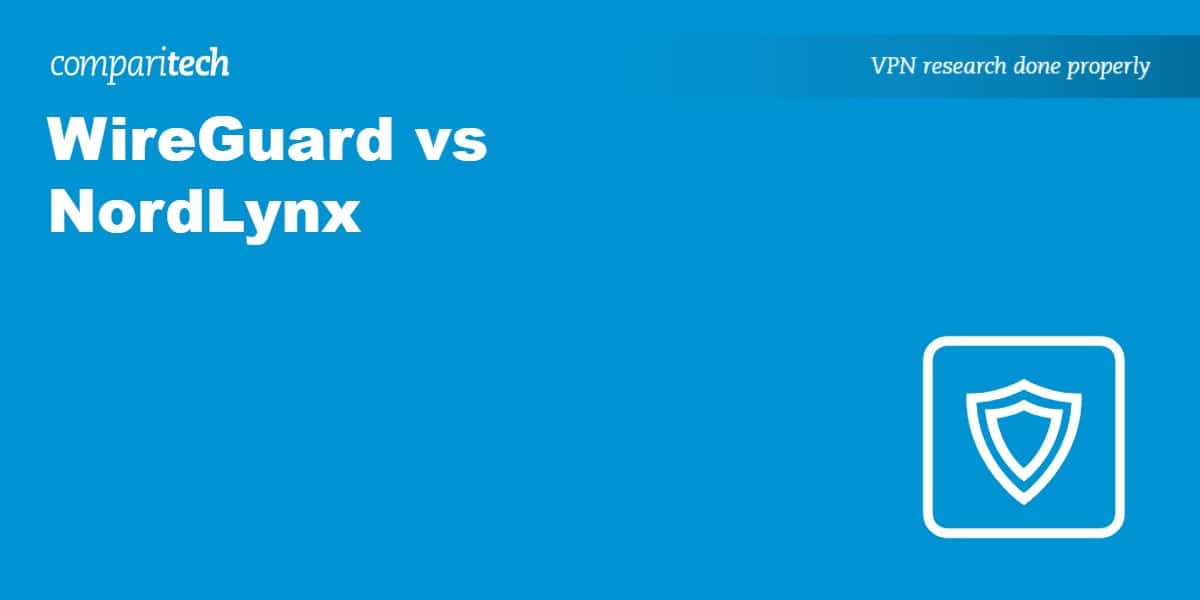If you’re looking into VPN protocols, chances are you’ve heard about WireGuard. The relatively young protocol has been adopted by many major VPN providers in recent years. However, you might not be as familiar with NordLynx, NordVPN’s proprietary version of the WireGuard protocol. Both WireGuard and NordLynx have plenty to offer, but how do they differ from each other?
We put WireGuard and NordVPN under the microscope in order to find out what they have in common as well as discover their differences. This will involve exploring their speed, security, support, and more. The hope is that you’ll then be able to make an informed decision as to which VPN protocol, WireGuard or NordLynx, is ultimately the best choice for you.
WireGuard and NordLynx history
WireGuard is an open source protocol created by Jason A. Donenfeld and first released in 2015. It was first developed in an effort to create a VPN protocol that would address some of the limitations of existing VPN protocols such as OpenVPN and IKEV2, improving performance and security. The aim was to create a new lightweight, efficient VPN protocol that was easy to configure, maintain, and audit without compromising security or privacy.
NordLynx was introduced in 2019 and is based on the WireGuard protocol. Unlike WireGuard, it’s not open source. Having been sufficiently impressed by the new WireGuard protocol, NordVPN decided to integrate it into their service. Due to the fact that WireGuard is relatively new, NordVPN looked to build on it in a few areas in order to overcome any potential vulnerabilities. We’ll explore the ways in which the two differ below.
WireGuard vs NordLynx: Which is better?
The reality is that the two protocols are very similar because NordLynx is a fork of WireGuard. We’ll explore the ways in which they match up as well as some of the key differences. To do this, we’ve broken the analysis down into key areas: speed, security, each protocol’s ability to go undetected, and their level of support.
Speed
WireGuard and NordLynx offer similar speed and bandwidth. There are multiple factors to take into account when it comes to your VPN’s connection speed. The VPN protocol you use is just one of these factors. Two VPNs running the same protocol could offer differing speeds based on how they’ve been configured.
When WireGuard was first introduced, one of its key selling points was the improved performance (speed) that it offered over existing protocols such as OpenVPN. VPN services such as Surfshark more than doubled their average speed after implementing the WireGuard protocol. While there are potentially other elements at play, it no doubt had a positive impact.
WireGuard has a lightweight design and this is one of the key reasons for its high level of efficiency. Its codebase is made up of just 4,000 lines of code (OpenVPN has approximately 70,000+ lines of code). An advantage of this is that it’s then easier to understand and maintain. It also uses modern cryptographic algorithms such as Curve25519, ChaCha20, and Poly1305 which strike a balance between performance and security.
It’s important to consider your base internet speed, the server location (and its distance to your physical location), and server load/congestion. Regardless of whether you use NordVPN and its custom protocol, NordLynx, or another VPN with WireGuard, you can expect good speeds for more bandwidth-intensive activities such as streaming and torrenting.
Security
Many VPNs that emphasize their security and privacy have adopted Wireguard. It’s widely considered to be safe. It uses Curve25519 for key exchange, ChaCha20 for channel encryption, and Poly1305 for authentication. These algorithms are known to be highly secure as well as efficient, which allows for faster speeds.
WireGuard’s concise codebase makes it easier to detect security vulnerabilities. Being open source means the wider community can review the code. The VPN protocol has also been independently audited on multiple occasions, identifying potential security issues so that the protocol can be further improved.
NordLynx also benefits from the above security features. The key difference is that NordLynx operates a double NAT (Network Address Translation) system. This allows NordVPN to establish a secure connection from your device using the NordLynx protocol and its VPN servers without logging identifying data such as IP addresses on disk. In contrast, WireGuard stores the user’s original IP address on the server by default, which many people consider to be a violation of their privacy.
Ability to go undetected
There’s no shortage of websites and services whose content is geo-blocked. While location restrictions are put in place for a variety of reasons, it’s often due to copyright and licensing. Some governments also impose high levels of online censorship, preventing citizens from accessing a wide range of online content, from news sites to social media platforms.
While you can use a VPN to bypass geo-blocking and censorship restrictions, VPN blocking can also be an issue. Neither NordLynx nor WireGuard has any specific capabilities to bypass VPN blocks. Wireguard uses UDP (User Datagram Protocol), which is a lightweight and efficient way to send data packets. Unfortunately, it’s relatively easy to block, particularly compared to TCP (Transmission Control Protocol).
The good news is that there are ways to bypass VPN blocking. Indeed, many of the VPNs that offer the WireGuard protocol offer such options. This includes using obfuscated servers or switching to a stealth VPN protocol. NordVPN does have obfuscated servers, but using them requires switching to the OpenVPN protocol, not NordLynx. Obfuscated servers disguise VPN traffic as regular web traffic, which prevents deep packet inspection (one of the methods to block VPNs in China).
Level of support
Despite the fact that WireGuard is a relatively new VPN protocol, it has already established itself as an efficient and secure choice. WireGuard was integrated into the Linux kernel starting from version 5.6 and is supported by multiple other operating systems including Windows, Mac, Android, and iOS. Most VPN services offer apps for all of these systems. This makes it easy to find a VPN that supports WireGuard and connect to a server using the protocol.
WireGuard has an active (and growing) community of users and contributors, providing support and developing extensions. However, not all VPNs offer WireGuard yet. More VPNs still support OpenVPN.
It’s fair to say that NordLynx’s level of support aligns with that of WireGuard. Improvements that are made to the WireGuard protocol also benefit NordLynx. Like WireGuard, NordLynx is available on all major operating systems. However, NordLynx is only available with NordVPN.
WireGuard vs NordLynx conclusion
WireGuard and NordLynx are similar in all areas. This is to be expected considering NordLynx is NordVPN’s own forked version of WireGuard. Regardless of which of the two VPN protocols you use, you can expect to enjoy fast server speeds as well as strong security. One of the key differences is that NordLynx is only available with NordVPN. Further, Nord’s double-NAT system better protects privacy by not storing identifiable data on a server.
WireGuard vs NordLynx: FAQ
Do any free VPNs offer WireGuard or NordLynx?
Not all paid VPNs offer WireGuard and even fewer free VPNs offer the protocol. While there are a small number of free VPNs that have implemented WireGuard, we don’t recommend you use them. Indeed, free VPNs will often take away from the benefits that WireGuard is supposed to provide, such as speed and security.
The average free VPN service offers fewer servers and IP addresses. This limits the content you can actually unblock. Furthermore, it’s common for free VPN services to throttle bandwidth so you wouldn’t particularly benefit from WireGuard’s impressive speed. This would have a negative impact on streaming which would suffer from lag and buffering as a result.
It’s important to be aware of some of the security and privacy risks as well. A free VPN may not provide an adequate level of encryption and may even lack other key security features such as a kill switch. Remember that free VPNs sometimes make money by selling user data to third parties. This may even include your browsing activity.
Which VPN protocol is the fastest?
The speeds you experience with a particular VPN protocol can vary based on multiple factors including server location, server load, and your own internet connection. Regardless, WireGuard is regarded to be one of the fastest VPN protocols you can use (NordLynx is accordingly fast). This is evidenced by the fact that multiple VPNs have posted significantly improved speeds following their implementation of the protocol.
For the fastest speeds, be sure to choose a VPN that offers the WireGuard protocol and unlimited bandwidth. Consider connecting to a server closer to your physical location so that data doesn’t have to travel as far (and travels faster as a result). It’s a good idea to connect to a server with lower load as well.
Which devices can I use WireGuard and NordLynx on?
You’ll be able to use both WireGuard and NordLynx on your desktop and mobile devices. They’re both supported on the following operating systems: Windows, Mac, Android, iOS, and Linux.
You can use a VPN to manually configure a WireGuard or NordLynx connection with a compatible wireless router. WireGuard works best with OpenWRT or DD-WRT router firmware and each VPN provides specific instructions to help you get set up.
Can I use WireGuard or NordLynx on multiple devices simultaneously?
Yes, VPNs that offer WireGuard typically allow multiple simultaneous connections per account. In some cases (such as Surfshark), you’ll be able to secure an unlimited number of devices simultaneously using the WireGuard protocol (or an alternative such as OpenVPN). NordVPN allows up to six simultaneous connections, so you will also be able to use NordLynx on multiple devices.
Will using WireGuard or NordLynx slow my internet speed?
Yes, using a VPN and protocol (regardless of the protocol in question) can slow your internet speed to a degree. This is normal because data is encrypted and routed to the VPN server before it reaches its destination. However, WireGuard and NordLynx are faster protocols and all of the VPNs we recommend that use WireGuard offer unlimited bandwidth. As such, you won’t necessarily notice a performance dip and should be able to stream and torrent as normal.
See also:



